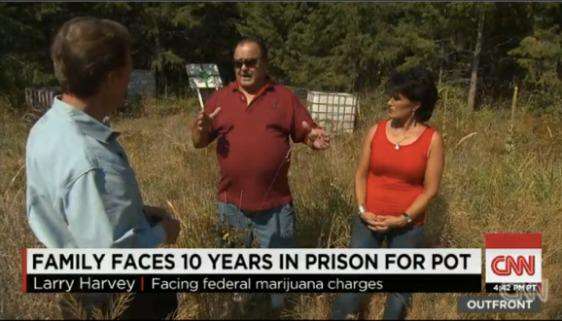The Kettle Falls Five, Now Four, Go on Trial This Wednesday
Medical marijuana patients face 10 years or more in federal prison.

Like the four other patients who faced federal charges in connection with a medical marijuana garden on his property in northeastern Washington, Larry Harvey was looking at a mandatory minimum sentence of 10 years. But since he has Stage IV pancreatic cancer, it was clear he would never serve much, if any, time behind bars. Last week, in light of Harvey's terminal illness, federal prosecutors dropped him from the case.
The four other defendants who comprise the Kettle Falls Five—Harvey's wife, Rhonda Firestack-Harvey; her son, Rolland Gregg; his wife, Michelle Gregg; and a family friend, Jason Zucker—are still scheduled to be tried at the federal courthouse in Spokane this week. Phil Telfeyan, an attorney who represents Rolland Gregg, says U.S. District Judge Thomas Rice has allotted less than an hour for jury selection on Wednesday, so the trial should begin the same day.
Federal prosecutors argue that the defendants were growing too much marijuana for their own needs, that they were not really complying with state law, and that some of the pot was intended for sale. But as I explained in a column a few weeks ago, prosecutors need not prove any of that to win convictions. All they have to show is that Firestack-Harvey and the others were growing marijuana, something they have never denied. The defendants are not allowed to say why they were growing marijuana, which is irrelevant under federal law.
Still, even if potential jurors have not heard about this particular case, which has received extensive news coverage, they surely will know that Washington has allowed both medical use of marijuana and cultivation for that purpose since 1999. They also will know that it is now legal in Washington to grow and sell marijuana for recreational use, a business that the federal government so far has not attempted to suppress. Weedmaps lists a dozen medical and recreational dispensaries in Spokane alone. Jurors may wonder why the Justice Department is trying people over a relatively small marijuana garden while tolerating the much bigger grow operations that supply businesses openly selling pot within a few miles of the courthouse.
The defendants have to hope that jurors will surmise what is really going on and rebel at the Justice Department's highly selective prosecution. Otherwise, it is hard to see how they can avoid convictions for the crimes they admit they committed.


Show Comments (14)